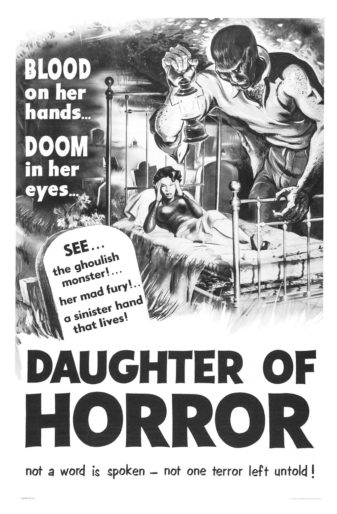 This dialogue-free oddity can be viewed as the ERASERHEAD of the fifties. It’s presented in two versions, one silent with music and the other with hilariously overwrought narration by the late Ed McMahon. My preference is for the latter.
This dialogue-free oddity can be viewed as the ERASERHEAD of the fifties. It’s presented in two versions, one silent with music and the other with hilariously overwrought narration by the late Ed McMahon. My preference is for the latter.
DEMENTIA was the only feature by exhibitor/aspiring producer John Parker. It began as a 10-minute short dramatizing a dream experienced by Parker’s secretary Adrienne Barrett, who starred in the film. Also featured were veteran B-movie actor Bruno Ve Sota and the dwarfish Angelo Rossitto (best known for his role in Todd Browning’s immortal FREAKS). Although the 57-minute feature version was completed in 1953, censorship problems dogged the film (it was rejected repeatedly by the N.Y. Censor Board as “inhuman and indecent”) and it remained unreleased until 1955, when exhibitor Herman Weinberg got involved.
DAUGHTER OF HORROR is the better known version. It was released in 1957 by B-movie impresario Jack H. Harris, with some controversial scenes excised and irresistibly nutty narration by the late Ed McMahon (several years before debuting as Johnny Carson’s announcer). That alone makes it worth viewing in my book: it’s Ed McMahon’s one and only horror movie!
A young woman awakens in a sleazy hotel room. Venturing out into the night, she spots a newspaper headline announcing that a brutal stabbing has occurred. The woman is accosted by a bum, but saved by a cop who beats the bum to a pulp; she responds to this by laughing uproariously.
From there she’s invited into a pimp’s gaudy car. The latter sells her to a fat man, who drags her to a succession of bars and nightclubs where sleazy go-go dancers and mobsters are the norm. But the woman, incited in large part by the aforementioned newspaper headline that always seems to be blowing around wherever she goes, flashes back to her traumatic childhood, in which she stabbed her abusive father to death.
…director John Parker favors low angle shots and shadows on walls, all set in a hallucinatory narrative of crime and pursuit.
Back in the here-and-now the woman becomes fed up with the fat guy and kills him…but then she thinks she sees the face of the murdered man on the (living) body of another. Rapidly losing her mind, the woman is pursued by a policemen with the face of her father through a succession of shadowy streets and dark alleys.
She ends up in a beatnik jazz club where spectral hands clutch at her and she again sees the face of the man she killed. But then she wakes up in the cheap hotel room where it all began. Apparently the preceding was all a dream…or was it???
DEMENTIA’S black-and-white photography is as dark and contrasty as any film noir. Like the noir filmmakers, director John Parker favors low angle shots and shadows on walls, all set in a hallucinatory narrative of crime and pursuit.
The film is essentially a surreal tour of 1950s-era beatnik culture, and packed with none-too-disguised Freudian symbolism (a limp cigar given by a man to a woman, who laughs at him in turn). Interestingly, the film isn’t entirely silent: in addition to the noisy music score, background ambiance can often be heard, along with footsteps and laughter. It’s very much a visual experience, however, with impressive cinematography by William Thompson, who also photographed the Ed Wood classics PLAN 9 FROM OUTER SPACE and GLEN OR GLENDA?
The film is essentially a surreal tour of 1950s-era beatnik culture, and packed with none-too-disguised Freudian symbolism…
The DAUGHTER OF HORROR version, with its unforgettable Ed McMahon narration, is far campier than the other—how could it not be with lines like “The pulse of the neon lights are like a hammer at your brain!” The baritone of Ed McMahon (who later described his delivery as “monstery”) is unmistakable. Such overripe psychobabble furthers the Ed Wood connection—and considering that DEMENTIA’S shock value has long since worn off, Ed Woodian camp is a most welcome addition.
Vital Statistics
DEMENTIA (a.k.a. DAUGHTER OF HORROR)
J.J. Parker Productions
Director/Producer/Screenwriter: John Parker
Cinematography: William C. Thompson
Editing: Joseph Gluck
Cast: Adrienne Barrett, Bruno Ve Sota, Ben Roseman, Ben Roseman, Richard Barron, Ed Hinkle, Lucille Rowland, Angelo Rossitto, Ed McMahon (voice)
